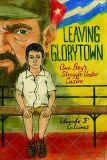For today's Nonfiction reviews, I give you two amazing biographies that were both Cybil nominations this year...
Leaving Glorytown: One Boy's Struggle Under Castro Eduardo F. Calcines
In January, 1959, Eduardo is only 3, but he remembers the coming of The Voice. Suddenly, The Voice is everywhere, being broadcast for hours from every radio, speakers rigged up outside. Everyone's listening to The Voice. Then, the soldiers are on every corner. As a 3-year-old, he's first fascinated by them, but then all the adults are short tempered and there's less to eat.
As he grows up in Castro's Cuba, Eduardo gets used to watching what you say, used to hunger, used to his father being gone at labor camp (for daring to apply for an exit visa), used to the jealousy as other families get their visa and his family is still stuck. They're on a deadline for the visa. When Eduardo turns 15, he'll be drafted into the army, so once he hits 14.5, his family's no longer eligible and they'll have to stay.
We don't get enough memoirs out of Cuba, especially for teens. This one is hard to put down, as we watch the situation grow worse and worse. Unlike other communist memoirs, this one's more chilling because while Mao and Lenin and the other revolutionaries are dead, Castro isn't and the situation in Cuba has only grown worse. Not only is is a good read, it's an important one.
Book provided by... my local library
Rock 'n' Roll Soldier: A Memoir Dean Ellis Kohler with Susan VanHecke
After graduating from high school in 1965 Dean Kohler's rock band landed a record deal and then he was drafted into the US Army. The deal got dropped when Kohler shipped out to Vietnam, serving as an MP in Qui Nhon, which was a port used to off-load supplies going deeper in country. Despite the fear and death and shooting, Kohler knows how lucky he is to not be on the front lines in the jungle, to not be in the
Deep Serious. Things also take a better turn when his commanding officer orders him to form a rock band. Kohler's band is soon traveling the area, playing shows for soldiers who are in the thick of things. Kohler has to balance the two sides of himself, is he a musician? Or a soldier? I deeply appreciated that there are two chapters and a epilogue that take place after he returns home. While not the focus of the book, Kohler does talk about returning home and trying to decide what to do next. Re-entry is a dimension that is often sadly left out of war stories.
One thing that's interesting for me (coming from a perspective of one who has done quite a bit of cultural and academic study of the Vietnam War) is that it takes place mainly in 1967 (1966 was spent in basic training), which was when the armchair historian tends to think things were just starting to heat up. Kohler is home before the Tet offensive. This is most obvious in the music. This is, after all, a book about a rock band. They do several covers, but when I (and, I think, many people) think 1960s, Vietnam, and Music, I tend to think of music from the late 60s, early 70s. Songs like "
Fortunate Son" (thanks
Forrest Gump) "
White Rabbit" or "
Purple Haze." Kohler's band is playing current hits-- "
(I Can't Get No) Satisfaction" "
Wipe Out" "
Louie, Louie" "
Louie, Louie" and "
Twist and Shout." I'm thinking
Crosby, Stills, and Nash, but Kohler's playing music by
The Hollies.
But, in the end, that just adds to the punch of the book. So much of our focus is on the later, post-Tet part of the war. We don't pay attention the what happened before and when we do, well, it was before things got bad. Even though Kohler isn't on the front lines, this is still a book about a war and forces us to re-look at our assumptions about it. While I do think older teens will enjoy this book immensely, I wonder if they'll have that same perspective. On the other hand, if we remind them from the beginning that there was a war before 1968, that can't be a bad thing.
Book Provided by... my local library
Round-Up is over at
Playing By the BookLinks to Amazon are an affiliate link. You can help support Biblio File by purchasing any item (not just the one linked to!) through these links. Read my full disclosure statement.
 Inside Out and Back Again
Inside Out and Back Again





